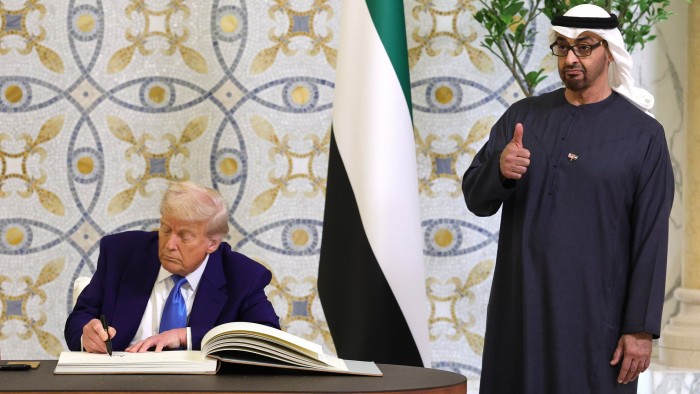UAE and US Collaborate on Major AI Data Centre Initiative
The United States and the United Arab Emirates (UAE) have unveiled plans to establish the largest cluster of artificial intelligence (AI) data centers outside of the United States, signaling the UAE’s ambitions to become a pivotal global hub for AI technologies. The announcement was made during a visit by President Donald Trump to Abu Dhabi, where he met with UAE President Sheikh Mohamed bin Zayed al-Nahyan and other key officials.
A Strategic Move for Economic Diversification
During this visit, which marked the third leg of Trump’s Gulf tour, the focus on AI underscored the region’s intent to diversify its economies, traditionally reliant on oil. The monarchies of the Gulf are increasingly pivoting towards advanced technologies, with substantial sovereign wealth funds eager to invest in AI developments.
The AI Campus in Abu Dhabi
The proposed AI campus in Abu Dhabi, developed by the Emirati AI company G42, will encompass an area of 10 square miles and is projected to possess 5 gigawatts (GW) of data center power. This capacity is estimated to accommodate over 2 million of Nvidia’s latest GB200 chips, illustrating a significant technological leap.
In immediate terms, the facility will launch a 1GW data center, requiring around 500,000 of Nvidia’s latest chips for operational purposes. In contrast, Elon Musk’s “Colossus” AI supercomputer in Tennessee operates with 200,000 of Nvidia’s previous generation Hopper chips.
Collaborations and Future Prospects
OpenAI is anticipated to become one of the campus’s primary tenants in a deal that has not yet been finalized. This partnership is part of OpenAI’s strategy to promote “democratic AI,” aiming to deploy its technologies to American allies as a countermeasure to Chinese alternatives. Chris Lehane, OpenAI’s Global Affairs Vice-President, emphasized the initiative’s mission to create robust frameworks for democratic values in AI technology.
Despite the strategic relevance of the UAE as a US ally, it is still subjected to export restraints similar to those applied to several other countries. Restrictions were put in place to control access to high-performance chips from companies like Nvidia, primarily due to national security concerns regarding technology flows to China.
Regulatory Changes and Future Growth
Recently, the Trump administration has taken steps to reduce these restrictions by eliminating a licensing regime proposed during the Biden administration that would have imposed limits on chip imports for tier 2 nations, including the UAE. The former assistant secretary for export administration, Thea Kendler, noted the current administration’s more favorable stance toward expanding AI development beyond American borders.
Reliable access to advanced chips is deemed essential for Gulf nations looking to build substantial AI infrastructures. Kendler highlighted that ensuring a continued supply of both current and future generation chips is crucial for investment in data centers.
Enhanced Partnerships and Global Technology Positioning
In connection with these advancements, Saudi Arabia also signed a deal with Nvidia to establish “AI factories” utilizing the latest processors. The UAE government has actively sought to reassure Washington of its commitment to collaborating with US firms rather than Chinese entities, with G42 publicly distancing itself from Chinese suppliers. Investments from Abu Dhabi funds into US AI initiatives, including significant contributions to Sam Altman’s Stargate project and BlackRock’s $30 billion AI infrastructure fund, further underscore this commitment.
The US Commerce Department has confirmed a partnership framework established between the US and the UAE on AI, assuring that technological safeguards will be instituted to manage the access and deployment of advanced AI systems. This agreement also specifies that powerful computational resources will be exclusively utilized by approved US cloud service providers.
The Broader Vision
Commerce Secretary Howard Lutnick referred to the partnership as a significant advancement in realizing President Trump’s objective of maintaining US leadership in AI. Sheikh Tahnoon bin Zayed al-Nahyan, G42’s chair, characterized the agreement as enhancing the UAE’s status as a leader in cutting-edge research and sustainable development.
During a prior visit to the White House, Sheikh Tahnoon pledged a commitment of $1.4 trillion in investments into the US over the next decade, marking a substantial step in fostering technological collaboration between the two nations.


